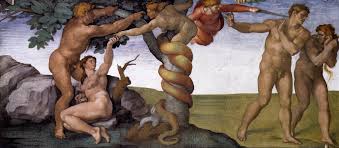When Our Lord and His Apostles came to the great rock of Caesarea Philippi, He asked a poignant question about His personality: “Who do you say that I am?”. Only Simon, enlightened by Divine grace, saw Our Lord for Who He really was: “You are the Messiah, the Son of the living God” (Mt 16:16). Once Peter identified Our Lord, Our Lord in turn gave him his true identity as the Great Rock upon which the Church herself would be identified. Peter was not alone in this regard. Our Lord came to bestow our identity upon each one of us. He identified with us in order that we might come to share in His identity as “sons in the Son.” Modern man, perhaps more than any other ailment, suffers from a great identity crisis that makes this moment in Our Lord’s Life particularly important.
The First Identity Crisis
Lucifer had the greatest natural endowment of all creatures. In this way he was entirely unique and, created in a state of grace, he was the most like God. This was his true identity. Rather than receive this identity as a gift, he instead chose to create his own. Lucifer became Satan and lost his true identity forever. He became, in the words of then-Cardinal Ratzinger an “Un-person”, corrupted beyond any personal recognition. Out of envy, Scripture says, Satan then became an Identity Thief attempting to steal everyone else’s identity. He began by coaxing a third of the angels to follow him in asserting their own identity.
Misery loves company and so Satan set his sights upon mankind. Ultimately his temptation of Eve amounts to questioning her true identity as a beloved daughter of God. He tells her that she will become like God. The problem, of course, is that she already was like God. God had gifted her with sanctifying grace which already made her “like God”. Satan tempts her to see her identity as something she must grasp, rather than receive and so simultaneously attacks her femininity. Likewise, with Adam, both his identity as being like God and being a man. It was the man who was commanded to protect and till the Garden.
Our identity crisis has its roots in the Fall then. Original Sin removed sanctifying grace, which forms our true identity, our God-likeness if you will. But it also wounded us in our sexual identity, the manner in which we individually image God. Not only does the distinctly feminine power of childbirth become labor for the woman, but, because man will be tempted to lord over her, she will be tempted to seize masculinity. Likewise, for man, the uniquely masculine way of working also becomes labor and he will be tempted to seize the feminine. Not only was God-likeness lost, both forgot what it meant to image God in their masculinity and femininity.

The crisis would grow until the New Adam and his suitable helpmate, the New Eve came. Satan could not steal either of their identities. He tried to steal Our Lord’s when He went into the desert. The enmity between him and Our Lady made her immune to Satan’s wiles. Our Lord and Our Lady then, each in their proper way, cooperated in restoring us not just as children of God, but sons and daughters.
Our Identity Crisis
Satan may have lost the war, but he is still engaging in the Battle across the centuries, trying to keep us from our true identity. He has had varying degrees of success but has been particularly successful in our own age. His battle plan remains the same as always by destroying the image and suppressing our desire for the true likeness of God that lies at the root of our real identity.
Rather than accepting God-likeness as a free gift that comes only through Baptism, we chase immortality through technology. The Covid crisis has been particularly eye-opening in this regard in that we are all expecting a technocratic Messiah to save us. Technology can make us like gods.
The Church has not been immune to this attack either, putting bodily health before spiritual health. One soul, dying in a state of grace, is far greater than 1000 people “safely” locked in their houses without any access to the gift of true God-likeness in the Sacraments. Christ instituted the Church, so that, throughout all-time, His unique power to bestow our true identity might be made available to all. When the Church forgets her true identity, then a mass identity crisis is sure to follow.
While technology is the weapon of choice to suppress our desire for true God-likeness, intersectionality, rooted in identity politics, is the weapon of choice to suppress our identity as being made in the image of God. Intersectionality attempts to root our identity in victimhood. Christ became a victim so that we could overcome this temptation and clear the way for our real identity. Sex, masquerading as gender, rather than being a way in which we individually image God, is simply a social construct made malleable (through technology) according to personal whims. This Great Lie destroys our identity rather than restoring it. It sits at the heart of today’s mass identity crisis and is nothing more than a ploy of the Evil One.
Genesis tells us that the Serpent, in attacking Adam and Eve’s identity was the most subtle of all the wild animals (Gn 3:1). What makes our age unique is that he has thrown subtlety out the window and has chosen to unmask himself. That is why we must be prepared to fight the identity crisis by refusing to be a party to any of the lies that have enabled the crisis to become so deep. Too often we simply go along to get along. The Devil has been hard at work stealing people’s identities, we need to be equally hard at work helping them find their true one.

